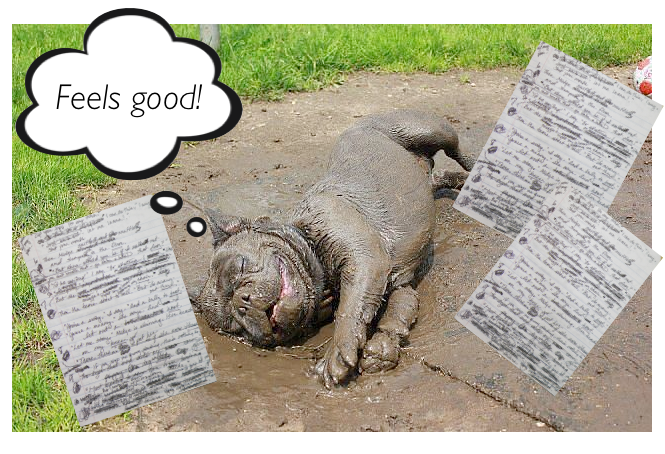
I used to agonize over writing essays. Writing every sentence was like sticking a pencil in my eyeball. It was a painful process.
But over time something has shifted. I now really enjoy writing.
How could this be? From pencil in the eye pain to enjoyment?
Well, I gave myself permission to write rubbish.
I write every day. Some days when I wake up, I say to myself “Go make a mess”. Other days I tell myself, “If something is worth doing, it’s worth doing badly”.
This is my way of slaying my inner perfectionist so I can get on with my writing tasks.
As Anne Lamott says in her book “Bird by Bird: Some Instructions on Writing and Life”:
“Perfectionism is the voice of the oppressor, the enemy of the people. It will keep you cramped and insane your whole life, and it is the main obstacle between you and a s*** draft”
It’s easy to feel overwhelmed when you look at other people’s completed and polished writing. Occasionally when I read a really good book or article I experience a wave of terror (“I could never write something as perfect as this!” I think) and perfectionism kicks in.
But then I remind myself of the simple fact that it’s very hard to get things perfect the first time round. Unless you’re an absolute genius and literary whiz-kid, good writing evolves with lots of editing.
Social psychologist Ellen Langer says “Every outcome is preceded by a process”. But so many of us forget this. As Langer states:
“[students] begin their dissertations with inordinate anxiety because they have seen other people’s completed and polished work and mistakenly compare it to their own first tentative steps. With their noses deep in file cards and half-baked hypotheses, they look in awe at Dr So-and-So’s published book as if it had been born without effort or false starts, directly from brain to printed page. By investigating how someone got somewhere, we are more likely to see the achievement as hard-won and our own chances as more plausible”
If only we could see all the previous revisions and scribble on the draft pages of award winning novels, perhaps then we would be a little easier on ourselves when it came to our own writing projects.
If you’ve been struggling with your writing, my advice to you is this: don’t be afraid to make a mess.
In her book “Writing your thesis in fifteen minutes a day”, Dr Bolker says, “Good writing emerges from making a mess and cleaning it up!”
This simple idea has completely changed the way I approach my writing projects.
She tells us to forget the elegant topic sentences or having a neat outline. Throw your ideas down. At this stage, you don’t want to be too concerned about whether it makes any logical sense. What you’re doing is creating a ‘zero draft’ (the draft before the first draft). You need to hold you nose and go through it because there will be gold in this that you can work with later on.
Dr Bolker goes onto state:
“I suspect many writing blocks come about because people aren’t used to playing in the mud when they write; they think writing is a neat, clean endeavor. I don’t…my aim is to make mud pies! I’m making a sketch, not a finished oil painting”
So whatever writing task you’ve been putting off, I invite you to go make a mess. Remember, you can always clean it up later.
You may be pleasantly surprised that once you get your ideas down and you have something (rather than a blank page) to work with, the writing process becomes a whole lot easier.
